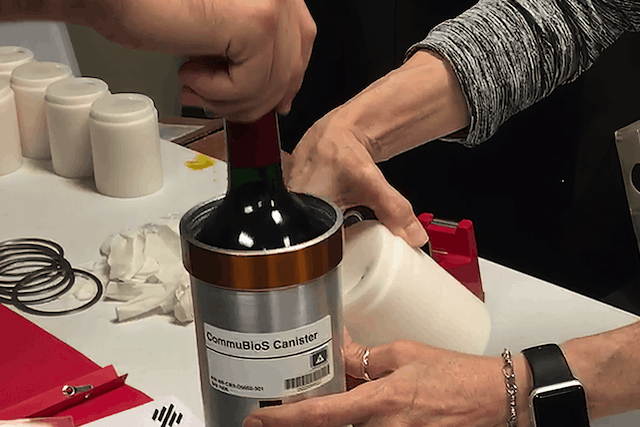“The vine is the canary in the mine: it is the first to feel the impact of global warming,” Nicolas Gaume, CEO and co-founder of Space Cargo Unlimited, said in an initial analysis. “We grew up with a love of science and an entrepreneurial spirit. Children of Jules Verne and Louis Pasteur. It was while studying wine that Louis Pasteur discovered pasteurisation and some of his theories.”
“The Earth is changing and we must act. How will we feed ourselves tomorrow? And how will we feed our children tomorrow? In the 1970s, the great houses of Bordeaux produced wines at 11 or 12°C. Today, the same terroirs are rather at 14°C. And tomorrow?” asked the entrepreneur.
On Wednesday, at the Bordeaux City Hall and in the presence of the mayor of Bordeaux, Pierre Hurmic, Gaume and his business partner, Emmanuel Etcheparr, presented a first salvo of feedback after the tasting of the first of twelve bottles of Petrus 2000 that spent 14 months (438 days and 19 hours) on the International Space Station, 450 kilometres from Earth, thanks to the French, European and American space agencies and partners such as Thales, Space X and Blue Origin. This is no small feat since both glass containers and alcohol are usually prohibited on the International Space Station.

Symbolically, during the press conference broadcast on Teams, Nicolas Gaume took one of the twelve bottles out of its packaging for space. Photo: SCU
“Space has environmental keys that we know little about,” Gaume said. “We recreated in space all the terrestrial parameters identically, except one: gravity, a fundamental element that has not changed for over four billion years. When we remove gravity, we create a prodigious stress and nature reacts and establishes a strategy. We hope that this stress and this strategy will show us a way forward,” he said.
Usually deep and fleshy, particularly suitable for pairing with liver and poultry, the 2000 Château Petrus, which sells for around €3,000 to €4,000 a bottle, was not damaged in space, assured the various experts who took turns to report their first impressions. The first tasting took place on 1 March, at the Bordeaux Institute of Vine and Wine Sciences, which organised an organoleptic tasting for 12 specialists, led by Philippe Darriet, director of the Institute's Oenology Research Unit.
It took the same force of extraction to uncork it as a Petrus 2000 that did not go into space, a sign that the cork had played its role. Differences were noted in terms of colour, aroma and taste.
“The wine has survived,” said the famous critic Jane Anson. “The tannins seem silkier, more evolved and the aromatic side is more accentuated, especially on the violet. It seems smokier too. I would say it seems to have two to three more years of aging compared to the same wine that stayed on Earth.”

The 320 vine shoots returned to Earth have been replanted in Brittany and their development is spectacular, even if it is still premature to draw conclusions. Photo: SCU
Experiments on these twelve bottles will continue until a first scientific paper is published around the research. In the meantime, 320 vine shoots also returned from space and were replanted in Brittany, in the greenhouses of the Mercier Group, a world leader in the production of vine plants and the creation of vineyards, with which Space Cargo Unlimited has secured a strategic partnership. “The first feedback, but it's still much too early to draw conclusions,” Gaume said. “It seems to indicate that the vine is growing much faster, has more leaves and is producing more fruit.”
The 12 bottles of Petrus headed to the International Space Station on 2 November 2019, with technical support from Thales Alenia Space and US-based Nanoracks, returning to Earth on 14 January aboard a Dragon capsule (SpaceX), before heading to Bordeaux as part of a research and analysis programme that will continue for several years. Space Cargo Unlimited is working with teams and partners in Bordeaux and Toulouse (France), Erlangen (Germany) and Turin (Italy) as part of the WISE mission.
This article was originally published in French on Paperjam.lu. It has been translated and edited for Delano.
